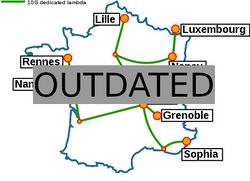Grid5000:Home
|
Grid'5000 is a large-scale and flexible testbed for experiment-driven research in all areas of computer science, with a focus on parallel and distributed computing including Cloud, HPC and Big Data and AI. Key features:
Grid'5000 is merging with FIT to build the SILECS Infrastructure for Large-scale Experimental Computer Science. Read an Introduction to SILECS (April 2018)
Older documents:
|
Random pick of publications
Five random publications that benefited from Grid'5000 (at least 2933 overall):
- Khaled Arsalane, Guillaume Pierre, Shadi Ibrahim. Toward Stream Processing Elasticity in Realistic Geo-Distributed Environments. IC2E 2024 - 12th IEEE International Conference on Cloud Engineering, IEEE, Sep 2024, Paphos, Cyprus. pp.1-9. hal-04655408v2 view on HAL pdf
- Maurice Brémond, Hugo Brunie, Laurent Debreu, Rupert W Ford, Florian Lemarié, et al.. Poseidon: A Source-to-Source Translator for Holistic HPC Optimizations of Ocean Models on Regular Grids. SC 2024 - International Conference for High Performance Computing, Networking, Storage, and Analysis, Nov 2024, Atlanta (Georgia), United States. , pp.1-1, 2024, 10.5281/zenodo.11190458. hal-04811677 view on HAL pdf
- Barbara Gendron, Gaël Guibon. SEC: Context-Aware Metric Learning for Efficient Emotion Recognition in Conversation. Proceedings of the 14th Workshop on Computational Approaches to Subjectivity, Sentiment, & Social Media Analysis (WASSA at ACL 2024), Aug 2024, Bangkok, Thailand. hal-04702997 view on HAL pdf
- Jérôme Rouzé, Nouredine Melab, Daniel Tuyttens. A Parallel Genetic Algorithm for Qubit Mapping on Noisy Intermediate-Scale Quantum Machines. International Conference in Optimization and Learning - OLA 2024, May 2024, Dubrovnik, Croatia. hal-04916922 view on HAL pdf
- Arun Thangamani. Optimized code generation of parallel and polyhedral loop nests using MLIR. Computer Science cs. Université de Strasbourg, 2024. English. NNT : 2024STRAD058. tel-04718259v2 view on HAL pdf
Latest news
Failed to load RSS feed from https://www.grid5000.fr/mediawiki/index.php?title=News&action=feed&feed=atom: Error parsing XML for RSS
Grid'5000 sites
Current funding
As from June 2008, Inria is the main contributor to Grid'5000 funding.
INRIA |
CNRS |
UniversitiesUniversité Grenoble Alpes, Grenoble INP |
Regional councilsAquitaine |


